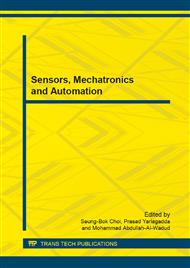p.1039
p.1044
p.1048
p.1053
p.1058
p.1063
p.1068
p.1072
p.1077
The Steady State Precision Control of DC Linear Motor Based on State Observer and Feedback
Abstract:
This paper proposes a guarantee steady state observation precision and pole assignment precision of the feedback controller, the basic idea is to introduce state observer can easily get dc linear motor speed and acceleration condition, state space pole assignment can pass, select the appropriate zero pole can improve the control performance of the motor. Based on the observation of the gain matrix can compensate for the steady-state error of the dc linear motor. Based on the observation of the gain matrix can compensate for the steady-state error of the dc linear motor. Matlab simulation results show that the control algorithm is compared with the traditional pole assignment, it is able to quickly and accurately follow the speed of the motor. The system has better dynamic and steady-state performance, and its characteristic of the closed-loop system robustness is stronger.
Info:
Periodical:
Pages:
1058-1062
Citation:
Online since:
February 2014
Authors:
Price:
Сopyright:
© 2014 Trans Tech Publications Ltd. All Rights Reserved
Share:
Citation:


